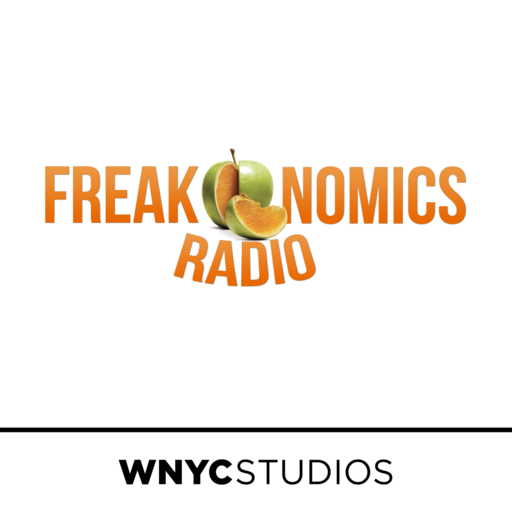Discover Freakonomics
Freakonomics

Freakonomics
Author: alphavoice.io
Subscribed: 1,400Played: 44,505Subscribe
Share
© Stephen J. Dubner and WNYC
Description
In their books "Freakonomics," "SuperFreakonomics" and "Think Like a Freak", Steven D. Levitt and Stephen J. Dubner explore "the hidden side of everything," telling stories about cheating schoolteachers and eating champions while teaching us all to think a bit more creatively, rationally, and productively. The Freakonomics Radio podcast, hosted by Dubner, carries on that tradition with weekly episodes. Prepare to be enlightened, engaged, perhaps enraged, and definitely surprised.
101 Episodes
Reverse
We all know our political system is “broken” — but what if that’s not true? Some say the Republicans and Democrats constitute a wildly successful industry that has colluded to kill off competition, stifle reform, and drive the country apart. So what are you going to do about it?
Family environments and “diversifying experiences” (including the early death of a parent); intrinsic versus extrinsic motivations; schools that value assessments, but don't assess the things we value. All these elements factor into the long, mysterious march towards a creative life. To learn more, we examine the early years of Ai Weiwei, Rosanne Cash, Elvis Costello, Maira Kalman, Wynton Marsalis, Jennifer Egan, and others. (Ep. 2 of the “How to Be Creative” series.)
A conversation with veteran NBA point guard Jeremy Lin, recorded for the Freakonomics Radio series “The Hidden Side of Sports.”
There are thousands of books on the subject, but what do we actually know about creativity? In this new series, we talk to the researchers who study it as well as artists, inventors, and pathbreakers who live it every day: Ai Weiwei, James Dyson, Elvis Costello, Jennifer Egan, Rosanne Cash, Wynton Marsalis, Maira Kalman, and more. (Ep. 1 of the “How to Be Creative” series.)
You said, “I’m sorry,” but somehow you haven’t been forgiven. Why? Because you’re doing it wrong! A report from the front lines of apology science.
The San Francisco 49ers, one of the most valuable sports franchises in the world, also used to be one of the best. But they’ve been losing lately — a lot — and one of their players launched a controversy by taking a knee during the national anthem. So why is everyone there so optimistic? To find out, we speak with the team’s owner, head coach, general manager, and star players, including their new $137.5 million quarterback. (Ep. 2 of “The Hidden Side of Sports” series.)
From the archive — It’s a hard question to answer, but we do our best.
We all know the standard story: our economy would be more dynamic if only the government would get out of the way. The economist Mariana Mazzucato says we’ve got that story backward. She argues that the government, by funding so much early-stage research, is hugely responsible for big successes in tech, pharma, energy, and more. But the government also does a terrible job in claiming credit — and, more important, getting a return on its investment.
From the archive — Doctors, chefs, and other experts are much more likely than the rest of us to buy store-brand products. What do they know that we don’t?
One of the world’s biggest and best-known companies just announced that its C.E.O. would be stepping down in the fall. We interviewed her as part of our series “The Secret Life of a C.E.O.," and we thought you might like to hear that episode again, or for the first time if you missed it back then.
In this live episode of “Tell Me Something I Don’t Know,” we learn why New York has skinny skyscrapers, how to weaponize water, and what astronauts talk about in space. Joining Stephen J. Dubner as co-host is the linguist John McWhorter; Bari Weiss (The New York Times) is the real-time fact-checker.
Societies where people trust one another are healthier and wealthier. In the U.S. (and the U.K. and elsewhere), social trust has been falling for decades -- in part because our populations are more diverse. What can we do to fix it?
A tiny behavioral-sciences startup is trying to improve the way federal agencies do their work. Considering the size (and habits) of most federal agencies, this isn't so simple. But after a series of early victories -- and a helpful executive order from President Obama -- they are well on their way.
Has our culture's obsession with innovation led us to neglect the fact that things also need to be taken care of?
Neuroscientists still have a great deal to learn about the human brain. One recent MRI study sheds some light, finding that a certain kind of storytelling stimulates enormous activity across broad swaths of the brain. The takeaway is obvious: you should be listening to even more podcasts.
Lessons from Tom Petty's rise and another rocker's fall.
Researchers are trying to figure out who gets bored - and why - and what it means for ourselves and the economy. But maybe there's an upside to boredom?
Doctors, chefs, and other experts are much more likely than the rest of us to buy store-brand products. What do they know that we don't?
The process is famously secretive (and conducted in Swedish!) but we pry the lid off at least a little bit.
When one athlete turned pro, his mom asked him for $1 million. Our modern sensibilities tell us she doesn't have a case. But should she?






Wow, that last bit about Val...Guy is such an incredible mensch and you really could hear the emotion in his voice. May her memory be a blessing and a reminder for why cutting government funding to healthcare in any way is tucking stupid. Seriously.
Sound quality sucks
climate change denier? wtf